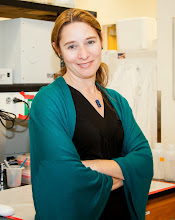I just attended the mid-winter meeting of the Association for Research in Otolaryngology, which is the big conference in my field (basically, hearing-related research). I heard some great research talks, and some not-so-great talks, which is pretty typical for a conference. While I won't single anyone out, the great talks all had one thing in common - enthusiasm! Whether a high-ranking professor or a new graduate student, the talks given with enthusiasm and passion all caught my attention.
We scientists are really passionate people. We can excitedly argue a minute point of our latest experiment for hours or get caught up in an impromptu late-night discussion of a colleague's recent findings. Why is it, then, that once we're in front of an audience we clamp down, sacrificing our passion and humanity for a dry portrayal of the data? Science is conducted by people...people with a deep interest in our work, and in what our work means. Let that interest and enthusiasm shine!
How do we let our passion come through? It's a simple recipe. Start with a smile, add a dash of increase voice volume, and sprinkle in some words like "excited to show you" or "fascinating new result" to convey your excitement. Nothing too fancy - just a few basic ingredients, combined in the right proportion to bring out the fresh flavors of our work. Test your recipe for enthusiasm today and watch your audience respond!
Speaking about Science...the blog about how to communicate scientific concepts to the public, and to other scientists, and about why we should care.
About Me

- Allison Coffin, PhD, DTM
- I'm an assistant professor of neuroscience at Washington State University in Vancouver, where I use tiny zebrafish (the size of an eyelash!) as a model system to study human hearing loss and how we can prevent it. I'm also a long-time Toastmaster and I teach communication workshops. This blog represents the merging of my two passions - science and communication, which has really become one central passion - the science of communication. There's a revolution in science right now...the idea that we scientists should sometimes leave the lab and talk about what we do, and why we do it, to real people. This blog looks at why we should do this, and how to actually talk about science with non-scientists (and with each other!). Portions of this blog are also featured on Qualia, the AAAS MemberCenter blog site.
I agree, enthusiasm is key to an engaging talk. As a lay-person, I may not fully understand everything being presented by a scientist. Words and numbers alone may not convey to me what I should take away from the talk. A presenter who expresses passion and enthusiasm cues me to get excited, too, and it stimulates my curiousity to learn more. Enthusiasm is both contagious and memorable!
ReplyDelete